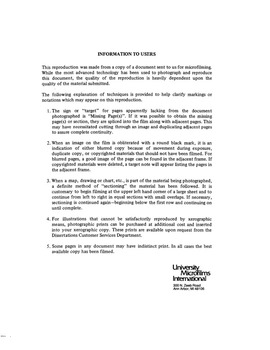| dc.contributor.author | Thompson, Darrell Ray, | en_US |
| dc.date.accessioned | 2013-08-16T12:29:20Z | |
| dc.date.available | 2013-08-16T12:29:20Z | |
| dc.date.issued | 1984 | en_US |
| dc.identifier.uri | https://hdl.handle.net/11244/5325 | |
| dc.description.abstract | A random sample of schools (N = 58) was selected from the population of public schools in Oklahoma. Once the sample population was selected, data were collected and analyzed. The multiple regression prediction model was utilized to analyze the data. The researcher wished to predict organizational climate pattern scores from decisional states scores. The analysis revealed that three of the five hypotheses posited were rejected, because the decisional states scores did not significantly predict organizational climate pattern scores. Two hypotheses were not rejected. These hypotheses stated that specific decisional states scores did not contribute significantly to the prediction model. | en_US |
| dc.description.abstract | Measures of decisional states were obtained from the Belasco and Alutto's Decisional States Scale. Organizational climate measures were obtained by using Litwin and Stringer's Profile of Organizational Climate. A pilot test and subsequent factor analysis was conducted to determine if the survey measurement instruments were appropriate. The measurement instruments were found appropriate instruments for the collection of data in the public schools of Oklahoma. | en_US |
| dc.description.abstract | This research focused upon the variable domains of decisional states (participatory decision-making) and organizational climate. Participatory decision-making theory and research suggest that there is a decision-making process in every organization. The theory and research on organizational climate suggest that an atmosphere (climate) is inherent in every organization. The problem for this research was: What is the relationship between organizational climate and decisional states? | en_US |
| dc.description.abstract | In summary, the researcher concluded that decisional states scores were not significant predictors of organizational climate pattern scores. This research challenged and contradicted previous research conducted in both participatory decision-making and organizational climate theory and research. It is recommended additional research be done in this area. | en_US |
| dc.format.extent | vi, 164 leaves ; | en_US |
| dc.publisher | The University of Oklahoma. | en_US |
| dc.subject | Education, Administration. | en_US |
| dc.subject | Education United States. | en_US |
| dc.subject | Decision making. | en_US |
| dc.title | The effect of decisional states upon organizational climate in public schools / | en_US |
| dc.type | Thesis | en_US |
| dc.thesis.degree | Ph.D. | en_US |
| dc.note | Source: Dissertation Abstracts International, Volume: 46-01, Section: A, page: 0043. | en_US |
| ou.identifier | (UMI)AAI8505918 | en_US |
| ou.group | Jeannine Rainbolt College of Education | |
